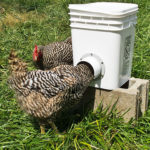Ingham County, MI
The lean-to is leaning too much. That’s the first thing I notice on the spring inspection of agri socvusae. The second is that my redneck Latin improves like a weekend golfer. The third is that a sodding groundhog is undermining the operation by mining under the cement slab on the north side of the barn. A whole corner of the barn floor dips like the economy toward China.
As I oil a trap, set it, and then place it over one opening of the groundhog’s run—the opening inside the first horseless horse stall (where a real horse would scare the underminer and obviate the need for a trap)—I imagine the look of surprise on the varmint’s face at that moment when the trigger trips, the springs release, and the jaws of the trap unite the fur on the back of his neck to the tendons in the front of his throat. If the kill is clean, he might last long enough to part with one syllable of rodent profanity—a fricative, no doubt, given those appalling front teeth. If the kill is less than clean, he’ll scratch out a final journey of maybe a few feet and then slump to stillness as life forsakes him—mercifully forsakes him, for he’ll never again have to look at his own butt-ugly reflection in the puddle by the lean-to.
I say “him” assuming I get the male. It’ll be just my luck not to. Then I’ll be trapping all summer long like some dumb-assed version of Grizzly Adams or John Liver-Eater Johnston.
The lean-to is an easy fix: I’ll push it to plumb with the loader, hold it there, and then tack a diagonal 2×4 across the frame. Of all the jobs awaiting me, this will be the easiest. Sometimes easy jobs offer little in the way of reward, but a farm building that’s true, even if it’s just a lean-to, is a fine thing to look at.
And over here at Stultus-Asinus Agri, which is just a short amble through the woods, I’ve brought in a bee hive from about eight or ten miles away. Under the cloak of darkness my knuckledheaded nephew and I placed the hive in a large cardboard box, taped it shut at the seams, closed the tailgate of the pick-up, and, still clad in the alluring garb of the bee-keeper, hoods and all, set out like space aliens upon a deserted country road.
“What do you suppose a cop would think if he stopped us?” I asked the boy. I was enjoying the prospect of a doughnut-fed county sheriff standing at the driver-side door, shining his flashlight into the truck, and, much to his surprise, beholding two humanoid-like creatures in canvas hoods, their visages obscured by mesh screens, a faint buzzing sound in the dark night air. I could see him cautiously turning his double chin and his ridiculous mustache toward the radio mouthpiece clipped to his uniform. It’s the television moment he’s waited his whole career for. He’s calling for back-up. And not just police back-up. Not just the National Guard. “Tell ’em to get the whole goddamn army in here!” He’ll be a hero. People will thank him for his service. The jocks who picked on him in junior high will be sorry.
My nephew’s opinion—and it is a sign of his successful tuition under my tutelage that he maintains a very low regard for cops—was that we had the upper hand. “We can always threaten to slit open the cardboard box,” he said.
We finished the job just after midnight. I’m not entirely sure what to expect of a society so wholly resigned to petticoat government, but I think the bees will like my neighbor’s untended four-acre field much better than the monocultures that surround the eight grassy acres I forcibly removed them from. Wild flowers bloom in abundance here. The bees would have to travel pretty far to find a field of corn or soybeans glazed in glyphosate. And, unlike people, they’ll neither want nor need to. Meantime, God save the Queen.
The spring garlic, the onions, and the potatoes are all in the ground and breaking the surface. The greens have just recently gone in. I am hopeful for the cukes again this summer and the peas and herbs and peppers. Do you suffer a paucity of hope in these unsettled and unsettling times? Put in a garden and watch it come to life. Go to it every day. Tend it. Ecce! Hortus! It’s a fine thing to look at.
I am determined that mine will have a small tool shed added to its west side this year. Soon I’ll dig the footings, set them, and start framing. The shed exists as a distinct idea in my mind: hanging door that slides, metal roof, cupola, re-used barn wood siding. On the south end of it, from chains affixed to the ridge board, I’ll depend a two-person swing. The goddess who walks in the garden in the cool of the day—she and I will sit there together of an afternoon in wonder and gratitude: gratitude for sweet basil and bluebirds, and wondering whether our kids will amount to a hill of beans.
The big question is: will the boys help me build the shed?—they whom the culture has successfully convinced that making money is the only skill they’ll ever need.
They know or should know my opinion on the matter: that they can learn the error of this doctrine the easy way by listening to me or the hard way by not. They also know or should know that when they tell me they’ll never need to know what I’m trying to teach them—or that they’ll “never use algebra again, so what’s the point?”—I will give the same reply I’ve given eleventy million times before: “You can’t know that; there’s no way you can possibly know that.”
I had a dream not long ago that I was looking in on my own wake from some indeterminate place outside it, and my children, grown, were sitting together talking about me. And then one of them—he had changed out of his fetching orange jumpsuit and put on a coat and tie for the occasion—said, “Remember how dad always used to say ‘you can’t know that; there’s no way you can possibly know that’”? And then they all burst out laughing. Whether they were laughing because their lives had proved me right or because their lives had proved me wrong the dream did not make clear. And then I awoke to discover I had not died and would not be granted any clarity on the matter.
Notwithstanding the terms that the dream was predicated on—namely, my own death—waking to find myself alive was a great disappointment. I wouldn’t know my children’s views on two of my other opinions: (1) being on time is the easiest thing in the world, and (2) you should never let the bastards have your money.
I have some fence-mending to do, which is good, because that’s work I enjoy, and I may have to relocate some of the hens from the coup to the freezer. Not a few of them are free-loading now, and one way to get nowhere with me is by imitating my teenage sons. They’ll ultimately find the crock pot set to low & slow—the birds, not the boys—because a laying hen is not your average frying-size chicken. That’s not a compliment.
The Craftsman riding mower I picked up free on the side of the road last summer was put to rights soon after the acquisition, but it needs a better cutting deck than the one it’s got. I’ll have to get in touch with my Inner Cheapskate and see about scaring up a used one somewhere—free, if all goes as planned. The old deck will be put to rest with the other scrap metal to await the resurrection, by which I mean the rising price of scrap. It will make good company for the heap of copper doing the same. Last summer I scrapped a wood-burning stove that couldn’t fetch the price of a bottle of scotch, which is just plain unchristian. It goes to show you that the times are out of joint in the land of debris and the home of the grave.
But damn me if I didn’t manage recently to communicate to a handful of students the richness of a life bouncing between head and hand. For well-nigh forty years I’ve been in a salutary alternating rhythm: nine months of headwork and then three months of hand labor, part of my life spent reading and writing and part of it spent setting swing joints in subterranean plumbing systems or pulling the weeds they nourish.
That’s something. Trust me. But the division is not quite that tidy. On a farm there’s always work to do, and you fit it in of a two-fold necessity: (1) it needs doing, and (2) the body you carry your consciousness around in needs something to do—evenings, weekends, whenever the somatic mass can sneak it in. If there isn’t work to do, you’re not on a farm. And anyway it would be a dull nine months if there were nothing for the hands to do, and a tiring three if there were no chair awaiting my arse, either in the early mornings or the in the late evenings, a book poised and ready and, beside it, strong coffee or strong waters, depending. And it would be a duller twelve months still if every day were the same dull round, and everywhere around me a dark Satanic mill.
I know a man, the father of one of my earliest friends, who is old now and has begun to take his slow leave of this life. He has a high school education and he spent his life as the head custodian of Buildings & Grounds at this same high school. In his working days he always carried around with him a small notebook so that if he encountered a word he didn’t know the meaning of he could write it down, look it up when he was at leisure, and scribble down the definition.
He’s in steep decline now. A stroke did that to him. He’s leaning too much and can’t be put to rights. Soon his bones will go on the pile to await the resurrection, when the price of human scrap will have gone up and the times put back in joint.
But he had an active mind during all the years that his body was sound. He read a lot. He had a good fund of local knowledge and history in him and, to boot, a harvest of natural history laid up in store. About thirty years ago I ran into him in a bookstore, and we struck up a conversation. I had pulled What Are People For? off a shelf; he recognized the cover. “That’s a Thomas Hart Benton painting,” he said. It was news to me. The name “Thomas Hart Benton” was news to me. As long as my own mind is active and my body sound I will remember the other thing he said to me that evening. He said that for him the ideal life is a mixture, about fifty-fifty, of doing good work with his hands and reading good books.
I don’t know that he ever read his fellow Michigander, Jim Harrison, though I wouldn’t be a bit surprised to discover that he had. But I’m fairly sure he would have agreed with what K says in Returning to Earth. (K is short for “Kenneth.) K is a reader but he’s no ninny. During his only sojourn to Europe he feels sorry for the “young intellectuals” he meets there “because the option of manual labor . . . was unthinkable” for them. “For better or worse,” he says, “I was the only one who knew how to build a house. I fixed a number of faucets, toilets, and sink traps for Sorbonne students that summer.” The upshot of this for K comes from his stepfather, David, whom K’s mother drags off to Hawaii during one of her breaks from teaching: “people who have meaningless work,” David tells K, “take meaningless vacations.”
I’m against vacations. Every movement of mind toward flesh, and of flesh toward mind, is a proper vacation of one from the other, be that movement daily or weekly or seasonal, back and forth, back and forth, rhythmically keeping time while taking time—or, maybe, spinning and twirling in an uncommon time signature at once unique and proper to earthly creatures shot through with mind and spirit, men and women alike, stepping in time. They cannot tell the dancer from the dance. And like a garden, like a lean-to put to rights, like a bee hive or a mended fence, a dancer that’s true is a fine thing to look at.







2 comments
Colin Gillette
This reminded me of the days working and living on my Aunt and Uncle’s dairy farm when a ground hog dug a small British village beneath the machine shed. It was like Watership Down, except the architect was slovenly and drunk.
After trap and firearms failed, it was a scrap of downspout taped to the exhaust of a beaten down Chevy pickup combined with an impromptu tire throw and pitchfork skewing that won the day. My Uncle, strong and athletic then, wanted this to be an Olympic sport.
He kept the .30-06 on loaded and o, the wall above the milking cooler, much to my Aunt’s chagrin and disapproval as being, “irresponsible and hillbilly” until she had to take out a coyote who meddled with the chickens.
My favorite “vacation” back then was finishing the milking on a Wednesday night when my Aunt and Uncle were able to get away to play or watch local softball one town over, and I took the opportunity to knock myself on my keester by firing a round into the side of the corn crib. I was a pipsqueak back then, as well as a dumb-ass. The only change in adulthood on that front is growing out of a small stature. The price I paid for that quick trip to the earth was a tanned ass, and never unlocking the mystery of the rifle’s new location.
My Uncle and I still don’t talk about it to this day. It’s in the same category of being discovered with a Playboy at 14.
Perhaps I am oversharing, and if so, my apologies. I really enjoyed this piece. It reminds me of real work, which at times feels in short supply, much like my youth.
Gerrit
Thanks for this enjoyable read. I am especially grateful for this quote: “… the ideal life is a mixture, about fifty-fifty, of doing good work with his hands and reading good books.”
I’m new to FPR and I look forward to learning more about Dumb-Ass Acres, for I feel I am near kin to dumb-assery. Best wishes,
Comments are closed.